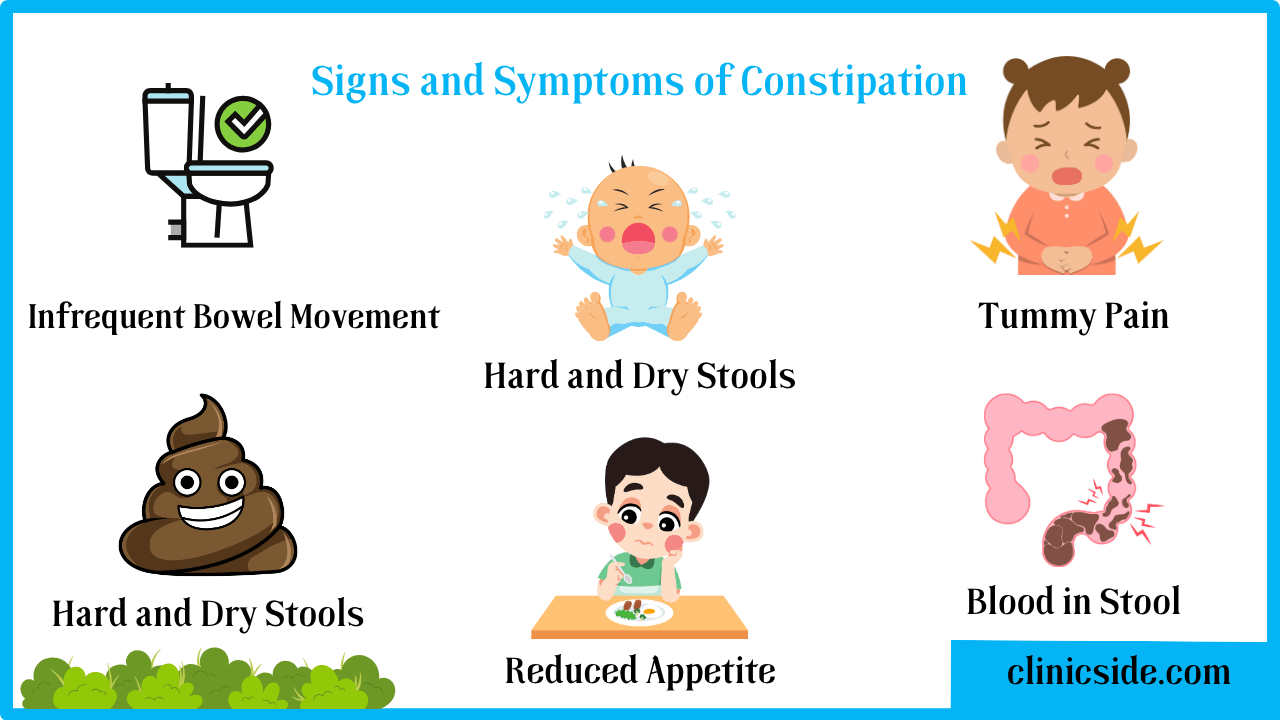All you need to know about constipation will be covered in this post, which is a clear and simple reference. We want to ensure that every reader can understand the topic. Now let’s get started and examine constipation in a clear and understandable manner.
Infant Constipation: Causes and Solutions:
Infant constipation can be upsetting for both the child and the parents. New parents often worry about this, but there are things you can do to help your baby feel better and find comfort. This blog post will cover the symptoms of infants constipation, possible causes, and practical solutions.
Infants:
The word “infant” originates from the Latin “infans,” which means “unable to speak. The term “infant” is used to describe children from the time of birth up to the age of one year.
What is constipation in infants?
Constipation in infants is a condition where a baby has difficulty passing stool, and the stool itself is often hard and dry.
Signs of Infant Constipation:
Infant constipation occurs when a baby has trouble passing stools. It can be uncomfortable for the baby, and it’s important for parents to recognize the signs.

Infrequent Bowel Movements
Your baby may poop less often than usual. Some infants might not poop for a few days.
Hard and Dry Stools
When your baby does poop, the stool may be hard, dry, and difficult to pass. It can look like small, pellet-like poops.
Straining and Discomfort
You might notice your baby straining, grimacing, or crying while trying to have a bowel movement. This can be a sign of discomfort.
Blood in Stool
In some cases, you may see streaks of blood in your baby’s stool. This can be a sign of irritation in the baby’s rectum.
Fussiness and Irritability
Constipation can make your baby cranky and fussy. They may seem uncomfortable or in pain.
Reduced Appetite
Babies with constipation may eat less than usual because they’re feeling uncomfortable or full.
Tummy Pain
Your baby may have a hard, bloated tummy, and you may feel gas or discomfort when you touch it.
Crying During Bowel Movements
Your baby may cry or show signs of discomfort when having a bowel movement.
Common Causes of Infant Constipation:
Diet and Feeding Issues:
- Formula Milk: Some babies can get constipated when they start using formula milk.
- Introducing Solids: When you start giving solid foods to your baby, it might affect their digestion.
Dehydration:
- Lack of Fluids: Not getting enough liquids can make poop harder and difficult to pass.
Lack of Fiber:
- Limited Fruits and Vegetables: If your baby’s diet lacks fruits and veggies, it can lead to constipation.
Changes in Routine:
- Travel and Stress: New environments or situations can affect your baby’s bowel movements.
Medical Conditions:
- Underlying Health Issues: Rarely, certain medical conditions can cause constipation.
Withholding Poop:
- Fear of Pain: Some babies might hold in their poop if they had a painful experience before.
Medications:
- Side Effects: Certain medications can lead to constipation in infants.
Potty Training:
- Early Training: Starting potty training too soon can sometimes cause constipation.
Help An Infant With Constipation:
Here are some effective methods to help relieve infant constipation:
Adjust Their Diet
- Breastfeeding: If you’re breastfeeding, make sure your baby latches properly.
- Formula Feeding: If you’re formula-feeding, consult your doctor to choose the right formula.
- Introduce Solids: Begin with age-appropriate solids like baby cereals.
Dietary Changes for Constipated Infants:
- Prune Juice: A small amount of diluted prune juice can work wonders for relieving constipation in infants. Consult your pediatrician for guidance.
- Fiber-Rich Foods: If your baby has started solids, incorporate high-fiber foods like pears, peas, and prunes into their diet.
- Monitor Dairy Products: Excessive dairy consumption can sometimes lead to constipation in infants. Keep an eye on dairy intake and consider alternatives.
Stay Hydrated
- Ensure your baby drinks enough fluids, either breast milk or formula.
- For babies over six months, you can offer small sips of water between feeds.
Tummy Massage
- Gently massage your baby’s belly in a clockwise direction to stimulate bowel movements.
Bicycle Leg Movements
- While your baby is on their back, gently move their legs in a bicycling motion to relieve gas and constipation.
Warm Bath
- A warm bath can relax your baby’s muscles and promote bowel movements.
Some over-the-counter syrups and liquid medications
There are several over-the-counter syrups and liquid medications that can help relieve constipation in both adults and children. Here are some common options:
Oral Laxatives:
- Docusate Sodium (Colace): It is a stool softener that makes stools easier to pass.
- Polyethylene Glycol (MiraLAX): Helps increase water in the intestines to soften stool.
- Lactulose Syrup: A readily available solution, both as a prescription and over-the-counter medication, designed to facilitate stool softening and encourage regular bowel movements. It is marketed in Pakistan under the brand name Duphalac Syrup.
Glycerin Suppositories:
- These are small suppositories that can be used rectally to relieve constipation. They come in a liquid form as well.
Follow these easy guidelines:
- Wash Your Hands:
- Begin by washing your hands thoroughly to keep things clean.
- Get the Suppository Ready:
- Open the suppository package and have it ready.
- Comfort Your Baby:
- Find a calm, quiet place and soothe your baby to reduce stress.
- Lubricate the Suppository:
- Dip the suppository’s rounded end in clean water or a water-based lubricant. This helps it go in smoothly.
- Position Your Baby:
- Lay your baby on their side or back with their knees bent towards their chest. It is simpler to inject the suppository in this position.
- Insert the Suppository:
- Gently slide the lubricated end of the suppository into your baby’s rectum, just a little way in. Try not to push too hard and be gentle.
- Hold Your Baby’s Buttocks:
- Hold your baby’s buttocks together for a few moments to prevent the suppository from popping out.
- Wait Patiently:
- Now, wait for about 15-20 minutes. Your baby might feel like passing stool soon.
- Diaper Up:
- Put on a clean diaper to catch any stool. Be prepared, as your baby may need a diaper change soon.
- Be Supportive:
- Offer comfort to your baby and keep an eye on them. If there are any concerns, consult your pediatrician.
Bulk-Forming Laxatives:
- Psyllium (Metamucil): This is a natural fiber supplement that adds bulk to the stool and helps it move through the intestines.
Herbal Remedies for infants constipation
When it comes to using herbal remedies for infant constipation, it’s important to exercise caution and consult with a pediatrician before trying any of these remedies, as infants are particularly sensitive and their bodies can react differently to substances. Here are a few gentle herbal options that might be considered:
Fennel Tea:
- Fennel tea is known for its digestive benefits and can be given in very small amounts to infants. Consult your pediatrician for proper dosing instructions.
Chamomile Tea:
- Chamomile tea has mild soothing properties and can sometimes help relieve gastrointestinal discomfort in infants. Make sure it’s very diluted and consult your pediatrician before use.
Prune Juice:
- Prune juice is a natural laxative and can be given to infants in small quantities, usually diluted with water. However, always consult with your pediatrician for the right dosage and timing.
When to See a Doctor for Infant Constipation?
Constipation in infants can be a common concern for parents, but in most cases, it can be managed at home with simple interventions. However, there are situations where it’s essential to seek medical advice and consult a doctor regarding your infant’s constipation. Here are some recommendations regarding when to get professionals help:
Duration of Constipation:
- If your infant has been constipated for more than a week, it’s advisable to consult a healthcare professional. Persistent constipation may indicate an underlying issue.
Age of the Infant:
- Newborns under one month old often have infrequent bowel movements, but after the first month, if your baby is consistently struggling with constipation, contact your pediatrician.
Severe Discomfort or Pain:
- If your infant is in significant pain or appears to be uncomfortable due to constipation, it’s a sign to consult a doctor. This may be evident through excessive crying, arching their back, or unusual body movements.
Blood in Stools:
- If you notice blood in your baby’s stools, it’s crucial to seek immediate medical attention, as this may indicate an underlying issue or a tear in the rectum.
Hard, Dry Stools:
- If your infant’s stools are consistently hard, dry, and difficult to pass, it’s a sign to consult a healthcare professional. This type of stool can lead to anal fissures and discomfort.
Feeding Changes:
- If you’ve recently changed your infant’s diet or formula and constipation persists, consult with a doctor. They can help determine if the new feeding routine is contributing to the issue.
Vomiting and Weight Loss:
- If your baby experiences vomiting or a significant decrease in weight along with constipation, it may be a sign of a more serious problem that requires medical evaluation.
Family History:
- If there’s a family history of bowel disorders or other medical conditions, it’s a good idea to discuss your infant’s constipation with a healthcare provider for a proper assessment.
NOTE:
Please note that while over-the-counter syrups can help with occasional constipation, it’s essential to use them according to the recommended dosage and guidelines provided on the product’s label. If constipation persists or becomes a recurrent issue, or if you have any concerns about using these medications, it’s advisable to consult with a healthcare professional for a proper evaluation and guidance. They can help determine the underlying cause and recommend the most appropriate treatment.





